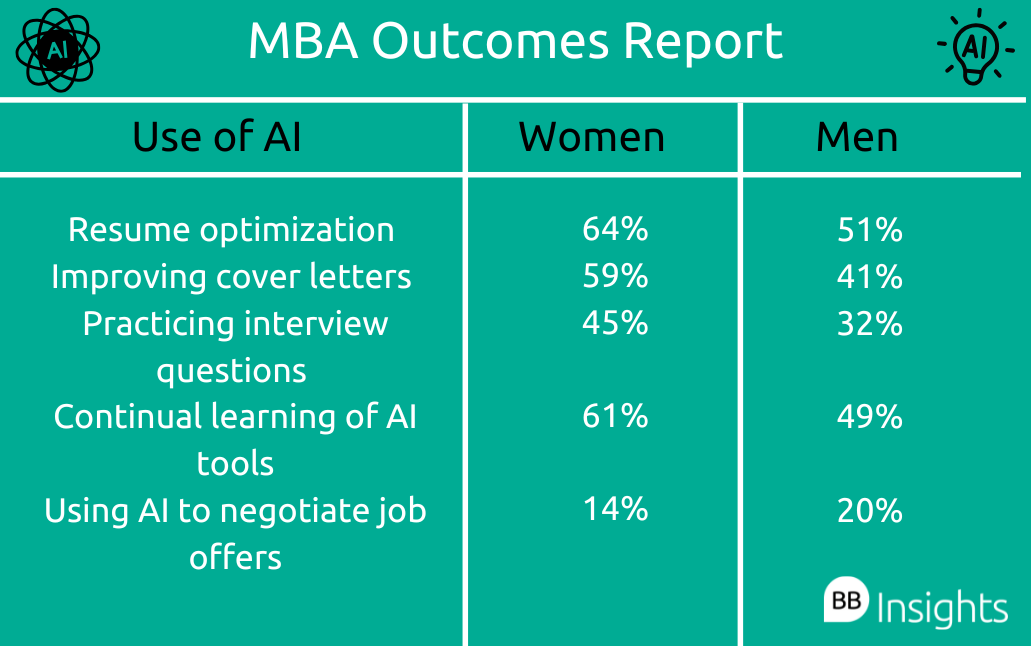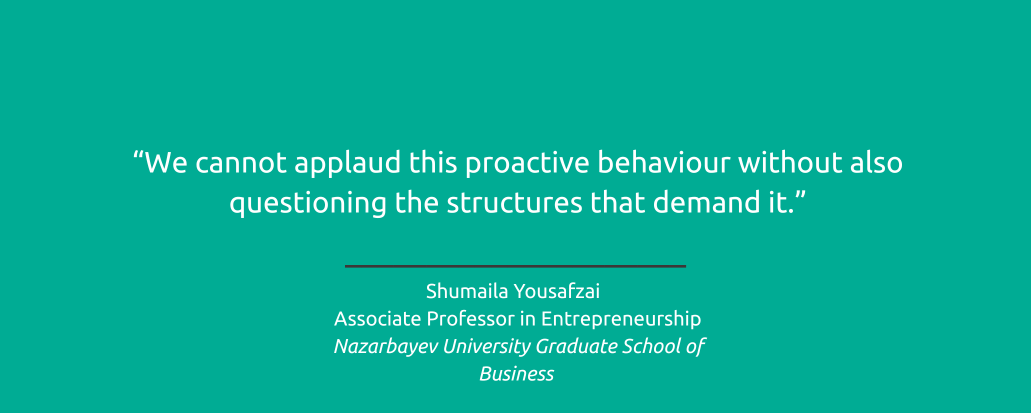ChatGPT, Perplexity, Google Gemini—the era of artificial intelligence (AI) is truly upon us. Each week it seems like a new platform launches promising to transform some aspect of our daily lives.
Despite the prevalence of the technology, many professionals remain hesitant to develop AI skills. According to the recently published MBA Outcomes report by the Forté Foundation—a nonprofit dedicated to achieving gender parity at all levels of business—male MBAs show greater reluctance than their female counterparts.
Polling alumni from more than 60 elite MBA programs across the US, Europe, and Canada, the Forté biennial study found that women lead in AI adoption for career upskilling and practical use.
The question is: in a world where female MBA graduates earn less on average than their male cohorts, how can companies and business schools support women to continue on this trajectory?
To find out, we spoke with business school students; professionals; and Elissa Sangster, CEO of the Forté Foundation.
AI adoption among MBAs: What the latest data reveals
Women MBAs lead in AI adoption
In the 2025 MBA Outcomes Report, the Forté Foundation examined ongoing gender disparities in MBA career outcomes, most notably, the persistent pay gap between men and women. But the report also uncovered a promising trend: women MBA holders are leading the way in using AI tools to advance their careers.
When seeking new roles, women are significantly more likely than men to harness AI. For instance, 64% of women reported using AI to optimize their resumes, compared to 51% of men. Meanwhile, 59% admitted to using AI to enhance their cover letters, versus 41% of men. When it came to interview preparation, 45% of women used AI tools, while only 32% of men admitted to doing so.
On the job, women are also more proactive in embracing AI. A significant 61% of female MBAs said they are “continually learning AI tools and interfaces,” in contrast to 49% of male MBA grads.
One area where men led, though, was in using AI to help negotiate job offers: 34% of men took advantage of AI for this purpose, as opposed to just 16% of women. This points to how traditional gender dynamics—especially around self-advocacy and negotiation—still influence how AI is used, even among highly skilled MBA professionals.
“I would like to see more women using AI to help negotiate job offers. If it helps them get better pay and benefit packages, it would also help to close the gender pay gap,” says Elissa Sangster, CEO of the Forté Foundation.

Progress or pressure?
On a surface level, this data highlights the increasing importance of AI in the business world, reflecting its rapid development and growing omnipresence. However, the picture is more complex than that.
On one hand, the increasing uptake of AI among female MBA holders can be seen as a positive development, helping them future-proof their careers in an increasingly technological world.
“I believe the finding that women are leading in AI adoption for career upskilling is encouraging and revealing. It suggests that women are actively seeking to future-proof their careers and stay competitive in a rapidly changing job market,” says Esha Mendiratta, professor of international business at Vlerick Business School.
“This engagement with emerging technologies challenges outdated stereotypes about women being less inclined toward tech-driven fields and shows a clear desire to close skill gaps that may otherwise widen in the age of AI.”
Julie Rosborough, deputy head of postgraduate education and MBA course director at Nottingham Business School, shares a similar view. She emphasizes that AI tools help women offload some of the organizational tasks they are often expected to handle—tasks frequently rooted in patriarchal expectations—allowing them to focus on other aspects of their careers.
“AI-powered tools enable women to streamline tasks, optimize workflows, and enhance their leadership capabilities, making it easier to balance demanding careers with other responsibilities.”
However, others feel the trend is more nuanced. Professor Shumaila Yousafzai, from Nazarbayev University Graduate School of Business, describes female MBA uptake of AI as a double-edged sword.
“Women leading in AI upskilling is both a hopeful and sobering sign. It speaks to their resilience, foresight, and commitment to staying ahead in an ever-changing workforce. But it also reveals an uncomfortable truth: women are continually being asked to do more just to be seen as equal.”
She adds that this trend reflects a broader pattern of “women over-preparing because they’ve been systemically undervalued.”

For some, the concerns are less about feminism and more about the broader implications of AI on human cognition. Many worry that using AI on the job could lead to the erosion of essential skills like critical reasoning.
“It is crucial for us to maintain our mental independence. We must continue to engage our creativity and thinking abilities, rather than lose them to advancing technology,” says Disha Chopra, a student at the Indian Institute of Management (IIM) Indore.
Alia Friedman, a full-time MBA student at Imperial Business School, shares a similar concern, noting that both women and men must use AI to supplement—not substitute—human thinking.
“You need to have the self-discipline to use it correctly and make sure you don’t fall into the trap of outsourcing your thinking. Used within these parameters, I’m strongly in favor of AI.”
How to support women in AI
Whether you see women leading in AI adoption as a positive or negative development, one thing is certain: AI skills are in high demand across various industries and adopting them can be highly advantageous.
But what do businesses need to do to ensure women are supported and able to continue adopting AI skills?
Julie Rosborough, deputy head of postgraduate education and MBA course director at Nottingham Business School, calls for businesses to implement a series of measures to ensure women have the support required to maintain their lead.
“Businesses must prioritize flexible work structures, ensuring women have the time and autonomy to integrate AI into their roles effectively. They should also invest in AI training and mentorship—equipping women with the tools and networks needed to lead in AI-driven industries.
“Additionally, they need to recognize AI adoption as a leadership accelerator—positioning women as key drivers of digital transformation,” she adds.
By embracing these strategies, Julie believes businesses can help close the gender pay gap and empower women MBAs—and women more broadly—to continue leading in AI.
The importance of this is clear. According to a study by the Berkeley Haas Center for Equity, Gender, and Leadership, which analyzed 133 AI systems across different industries, about 44% of them demonstrated gender bias. Why? Because they are often developed on biased datasets, overwhelmingly created by men. For instance, according to the school’s Mitigating Bias in Artificial Intelligence handbook, 80% of AI professors are men.
As such, Esha Mendiratta from Vlerick Business School notes that for women to truly benefit from increased AI adoption—and to prevent further setbacks in gender equality—companies and business schools need to focus on utilizing AI platforms developed by women.

“Increasing the diversity of those developing these technologies, such as women and underrepresented minorities, can help ensure that such biases are identified and addressed. When the people building AI tools reflect the diversity of those who use them, the tools are more likely to be accurate, inclusive, and socially responsible,” Esha says.
As CEO of the Forté Foundation, Elissa also feels that most businesses are failing to formally recognize AI upskilling. She points out that employees—particularly female MBAs—need to be proactive in ensuring their efforts are acknowledged.
“While I’m glad women are upskilling in AI, I don’t think companies are formally tracking learning and development in a way that weaves it into performance reviews or includes it in promotion criteria. It is up to the employee to bring it up as a factor for consideration.”



